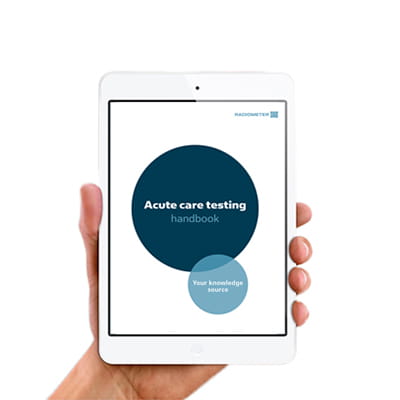Printed from acutecaretesting.org
November 2017
Reduced glucose (hypoglycemia) in neonates – a review article
Summarized from Thompson-Branch A, Havranek T. Neonatal hypoglycemia. Pediatr Rev 2017; 38: 147-57
Reduced blood glucose (hypoglycemia) is common during the hours and days following birth. This so-called neonatal hypoglycemia may be transitory and asymptomatic but can result in a range of acute symptoms. If sufficiently prolonged, the condition is associated with risk of irreversible neurological (brain) damage.
Controversy has always surrounded the precise plasma/blood glucose concentration that should be used to diagnose neonatal hypoglycemia (currently, the most widely used is plasma glucose <2.6 mmol/L (<47 mg/dL) but is disputed). This enduring controversy is just one of many topics addressed by the authors of a recently published comprehensive review of neonatal hypoglycemia.
The article begins with consideration of the metabolic pathways (glycolysis, glycogenesis, glycogenolysis, gluconeogenesis) and hormones (insulin, glucagon, epinephrine, growth hormone, cortisol) involved in the regulation of blood glucose concentration and provision of adequate constant supply of blood glucose for normal brain function/development.
There follows consideration of the epidemiology of neonatal hypoglycemia and the controversy that surrounds the laboratory definition of neonatal hypoglycemia. One of the problems surrounding the definition, highlighted by the authors, is the observation that hypoglycemia occurs without ill effect in 10 % of healthy full-term neonates during the first 24-48 hours; during the first 2 hours after birth levels may be as low as 1.67 mmol/L (30 mg/dL) with spontaneous rise to values similar to adults within 48-72 hours.
As the authors reflect, this transitional hypoglycemia poses no threat, is usually asymptomatic and can be considered part of the normal adaptation that occurs during the passage from supported uterine life to independent postnatal life. Rarely, hypoglycemia occurring during the first 24-48 hours of life persists. Hypoglycemia that persists beyond 48 hours cannot be considered transitional or physiological but pathological and in need of urgent correction.
Other topics considered in this article include: risk factors and causes of neonatal hypoglycemia (both transitional and persistent presentation); signs and symptoms; treatment options; and further investigation to identify the cause of persistent hypoglycemia. One section of the article is devoted to discussion of two recently published guidelines for screening and management of neonatal hypoglycemia from the American Academy of Pediatrics (AAP) and the Pediatric Endocrine Society (PES).
The first of these focuses on the screening and management of at-risk or symptomatic infants in the first 24 hours of life (i.e. during the time when transient hypoglycemia is most likely) and the second focuses on the period post 48 hours of life when persistent (non-transitional) hypoglycemia could become evident.
The authors include brief discussion of issues surrounding sample type (arterial, venous or capillary blood and plasma versus whole blood) used to measure glucose, the various methods of glucose analysis, and preanalytical errors that can invalidate glucose results.
May contain information that is not supported by performance and intended use claims of Radiometer's products. See also Legal info.
Acute care testing handbook
Get the acute care testing handbook
Your practical guide to critical parameters in acute care testing.
Download nowScientific webinars
Check out the list of webinars
Radiometer and acutecaretesting.org present free educational webinars on topics surrounding acute care testing presented by international experts.
Go to webinars







